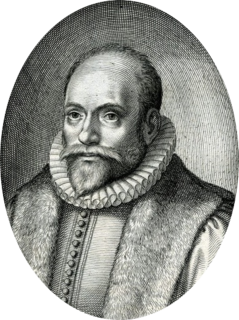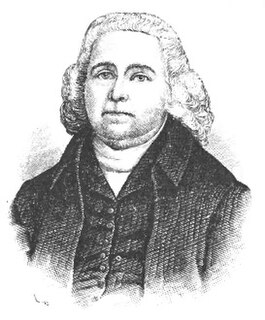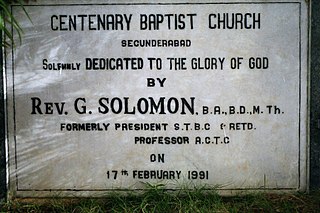
Arminianism is a branch of Protestantism based on the theological ideas of the Dutch Reformed theologian Jacobus Arminius (1560–1609) and his historic supporters known as Remonstrants. His teachings held to the five solae of the Reformation, but they were distinct from particular teachings of Martin Luther, Huldrych Zwingli, John Calvin, and other Protestant Reformers. Jacobus Arminius was a student of Theodore Beza at the Theological University of Geneva. Arminianism is known to some as a soteriological diversification of Calvinism; to others, Arminianism is a reclamation of early Church theological consensus.

Baptists form a major branch of Protestantism distinguished by baptizing professing Christian believers only, and doing so by complete immersion. Baptist churches also generally subscribe to the doctrines of soul competency, sola fide, sola scriptura and congregationalist church government. Baptists generally recognize two ordinances: baptism and communion.

A creed is a statement of the shared beliefs of community in the form of a fixed formula summarizing core tenets.

The Southern Baptist Convention (SBC) is a Christian denomination based in the United States. It is the world's largest Baptist denomination, the largest Protestant and the second-largest Christian denomination in the United States, smaller only than the Roman Catholic Church according to self-reported membership statistics.

The Lutheran Church–Missouri Synod (LCMS), often referred to simply as the Missouri Synod, is a traditional, confessional Lutheran denomination in the United States. With slightly under 2 million members, it is the second-largest Lutheran body in the United States. The LCMS was organized in 1847 at a meeting in Chicago, Illinois, as the German Evangelical Lutheran Synod of Missouri, Ohio, and Other States, a name which reflected the geographic locations of the founding congregations.

The American Baptist Churches USA (ABCUSA) is a mainline Baptist Christian denomination within the United States. The denomination maintains headquarters in Valley Forge, Pennsylvania. The organization is usually considered mainline, although varying theological and mission emphases may be found among its congregations, including modernist, charismatic and evangelical orientations. It traces its history to the First Baptist Church in America (1638) and the Baptist congregational associations which organized the Triennial Convention in 1814. From 1907 to 1950, it was known as the Northern Baptist Convention, and from 1950 to 1972 as the American Baptist Convention.

Reformed Baptists are Baptists that hold to a Calvinist soteriology. They can trace their history through the early modern Particular Baptists of England. The first Reformed Baptist church was formed in the 1630s. The 1689 Baptist Confession of Faith was written along Reformed Baptist lines.
The Baptist Faith and Message (BF&M) is the statement of faith of the Southern Baptist Convention (SBC). It summarizes key Southern Baptist thought in the areas of the Bible and its authority, the nature of God as expressed by the Trinity, the spiritual condition of man, God's plan of grace and salvation, the purpose of the local church, ordinances, evangelism, Christian education, interaction with society, religious liberty, and the family.
The 1689 Baptist Confession of Faith, also called the Second London Baptist Confession, was written by Particular Baptists, who held to a Calvinistic soteriology in England to give a formal expression of their Christian faith from a Baptist perspective. Because it was adopted by the Philadelphia Association of Baptist Churches in the 18th century, it is also known as the Philadelphia Confession of Faith. The Philadelphia Confession was a modification of the Second London Confession that added an allowance for singing of hymns, psalms and spiritual songs in the Lord's Supper and made optional the laying on of hands in baptism.
Hyper-Calvinism is a branch of Protestant theology that denies the universal duty of human beings to believe in Christ for the salvation of their souls. It is at times regarded as a variation of Calvinism, but critics emphasize its differences from traditional Calvinistic beliefs.

Benajah Harvey Carroll, known as B. H. Carroll, was a Baptist pastor, theologian, teacher, and author.

Isaac Backus was a leading Baptist preacher during the era of the American Revolution who campaigned against state-established churches in New England.

The Fundamentalist–Modernist controversy is a major schism that originated in the 1920s and '30s within the Presbyterian Church in the United States of America. At issue were foundational disputes about the role of Christianity, the authority of Scripture, the death, Resurrection, and atoning sacrifice of Jesus. Two broad factions within Protestantism emerged: Fundamentalists, who insisted upon the timeless validity of each doctrine of Christian Orthodoxy, and Modernists, who advocated a conscious adaptation of religion in response to the new scientific discoveries and the moral pressures of the age. At first, the schism was limited to Reformed Christianity and centered about Princeton Theological Seminary, but soon spread, affecting every denomination of Christianity in the United States. Denominations that were not initially affected, such as the Lutheran Church, eventually were embroiled in the controversy leading to a schism in the Lutheran Church.
Beginning in 1979, the Southern Baptist Convention (SBC) experienced an intense struggle for control of the organization. Its initiators called it the Conservative Resurgence while its detractors labeled it the Fundamentalist Takeover. It was launched with the charge that the seminaries and denominational agencies were dominated by liberals. The movement was primarily aimed at reorienting the denomination away from a liberal trajectory.

The Triennial Convention was the first national Baptist denomination in the United States. Officially named the General Missionary Convention of the Baptist Denomination in the United States of America for Foreign Missions, it was formed in 1814 to advance missionary work and headquartered in Philadelphia, Pennsylvania. In a dispute over slavery and missions policy, Baptist churches in the South separated from the Triennial Convention and established the Southern Baptist Convention in 1845. This split left the Triennial Convention largely Northern in membership. In 1907, the Triennial Convention was reorganized into the Northern Baptist Convention, which was renamed American Baptist Churches USA in 1972.

The Reformed Episcopal Seminary is a Reformed Episcopal theological seminary in Blue Bell, Pennsylvania. It was founded in 1887 as the first seminary of the Reformed Episcopal Church.

Keach's Catechism is a Reformed Baptist catechism consisting of a set of 118 basic questions and answers from scripture teaching readers the basics of the Reformed Baptist faith.

G. Solomon(born 28 December 1910; died 6 February 1993) was an Old Testament Scholar and a Baptist Patriarch hailing from the Protestant Samavesam of Telugu Baptist Churches Society (an affiliate member of the Baptist World Alliance and the National Council of Churches in India) and led it as its President during the years 1978-1982 overseeing the spiritual affairs of the Church Society whose ecclesiastical jurisdiction comprises the three states of Tamil Nadu, Andhra Pradesh and Telangana with 873 Churches comprising nearly a million members per present statistics.











